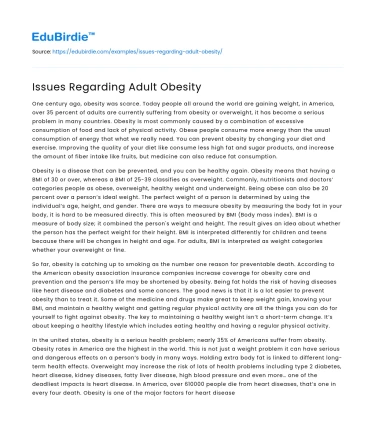Introduction
Adult obesity has emerged as a significant public health concern globally, with its prevalence showing an alarming upward trend. Defined as an excessive accumulation of body fat, obesity is measured using the Body Mass Index (BMI), where a BMI of 30 or above is considered obese. According to the World Health Organization, obesity has nearly tripled since 1975, affecting millions worldwide. This condition is not merely a cosmetic issue but is associated with numerous health complications such as cardiovascular diseases, diabetes, and certain cancers. The societal and economic implications of obesity are profound, leading to increased healthcare costs and reduced productivity. Despite various interventions and public health campaigns, curbing obesity remains a formidable challenge due to its multifaceted etiology involving genetic, environmental, and behavioral factors. This essay explores the primary issues related to adult obesity, the underlying causes, and potential strategies for mitigation.
Environmental and Behavioral Contributors to Obesity
The environment in which individuals live significantly influences their likelihood of developing obesity. Modern societies are characterized by an abundance of high-calorie, low-nutrient foods, often referred to as "obesogenic environments." Fast food outlets are ubiquitous, and marketing strategies aggressively promote the consumption of unhealthy foods. These factors contribute to poor dietary choices, which are a leading cause of obesity. Additionally, urbanization and technological advancements have resulted in more sedentary lifestyles. For example, desk jobs, reliance on cars, and the proliferation of digital entertainment have significantly reduced physical activity levels, further exacerbating the obesity crisis.
Save your time!
We can take care of your essay
- Proper editing and formatting
- Free revision, title page, and bibliography
- Flexible prices and money-back guarantee
Behavioral patterns also play a critical role in the prevalence of obesity. Stress, lack of sleep, and emotional eating are common behaviors that contribute to weight gain. For instance, a study by the CDC highlighted that adults who sleep less than seven hours per night are more likely to have obesity compared to those who sleep sufficiently. Moreover, the fast-paced lifestyle in contemporary society often leads to the consumption of convenience foods, which are typically high in fats and sugars. Social influences, such as family dining habits and cultural norms regarding food, also impact individual eating behaviors.
Addressing these environmental and behavioral contributors requires a multifaceted approach. Public health initiatives should focus on creating supportive environments that promote healthy eating and active living. Policies that regulate food marketing, improve access to nutritious foods, and encourage physical activity could help mitigate these contributors. Moreover, community-based interventions that educate individuals about healthy lifestyle choices can empower people to make informed decisions about their health.
Genetic and Biological Factors Affecting Obesity
While environmental factors are significant, genetic predispositions also play a crucial role in the development of obesity. Research has identified several genes associated with increased body weight and fat accumulation. For instance, the FTO gene has been linked to higher risks of obesity. Individuals with certain genetic markers may have a slower metabolism, leading to the accumulation of excess calories as fat. Furthermore, hormonal imbalances, such as those involving leptin and insulin, can influence hunger, satiety, and energy storage, contributing to obesity.
Acknowledging the genetic and biological underpinnings of obesity is essential in developing effective interventions. Personalized approaches that consider an individual's genetic makeup and metabolic profile can optimize weight management strategies. For example, pharmacological treatments that target specific metabolic pathways have shown promise in managing obesity. However, these solutions must be integrated with lifestyle modifications to achieve sustainable outcomes.
It is crucial to recognize that genetic factors do not solely determine obesity; they interact with environmental and behavioral factors. This understanding underscores the importance of a comprehensive approach to obesity prevention and treatment. As researchers continue to unravel the complex interplay between genes and environment, more targeted and effective interventions can be developed.
Societal Impact and Economic Burden of Obesity
The societal ramifications of adult obesity are extensive, impacting not only individual health but also economic stability and social structures. Healthcare systems across the globe are burdened by the rising costs associated with treating obesity-related diseases. In the United States, for example, the estimated annual medical cost of obesity was approximately $147 billion in 2008, and this figure has only increased over time. These costs are borne by individuals, healthcare providers, and insurance systems, straining resources and limiting the availability of care for other conditions.
Beyond the economic implications, obesity also affects social dynamics. Individuals with obesity may face discrimination and stigmatization, leading to psychological distress and reduced quality of life. This stigmatization can create a vicious cycle, where affected individuals are less likely to seek help or engage in social activities, further exacerbating the condition. Addressing the societal impact of obesity requires comprehensive strategies that include public health policies, community support systems, and educational programs that promote inclusivity and understanding.
Efforts to reduce the economic and social burden of obesity should focus on prevention and early intervention. Investing in public health campaigns that promote healthy lifestyles and provide resources for weight management can help reduce the prevalence of obesity. Additionally, fostering a societal shift towards greater acceptance and support for individuals struggling with obesity can mitigate the stigma and psychological impact of the condition.
Conclusion
In conclusion, adult obesity is a complex and multifaceted issue with significant health, economic, and social implications. While environmental and behavioral factors are substantial contributors, genetic predispositions and societal influences also play critical roles. Addressing obesity requires a holistic approach that includes public health policies, community interventions, and personalized strategies tailored to individual needs. By adopting a comprehensive strategy that involves all stakeholders, from policymakers to individuals, it is possible to curb the rising tide of adult obesity and mitigate its far-reaching impacts. Continued research and collaboration across disciplines will be essential in developing innovative solutions to this pervasive public health challenge.






 Stuck on your essay?
Stuck on your essay?

